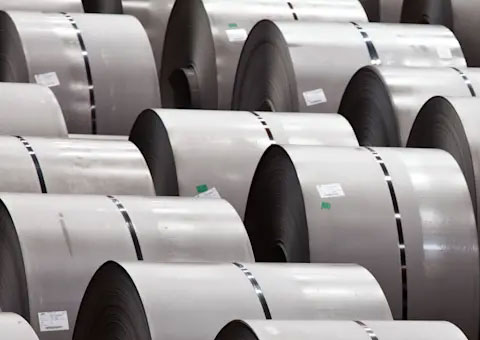The Indian conglomerate is prepared to invest over €2 billion in the green transformation of TKSE and assume its pension obligations
German conglomerate Thyssenkrupp has announced that it has received a non-binding offer to acquire its steel division, Thyssenkrupp Steel Europe (TKSE), from Indian group Jindal Steel International, part of the Naveen Jindal Group. This marks a new stage in years of attempts to spin off the steel business, which remains Germany’s largest steel producer with annual sales of €10.7 billion, Reuters reports.
On the news, Thyssenkrupp shares rose nearly 8% to a four-and-a-half-year high and closed up 4.4%. The company said it would carefully examine the offer, particularly in terms of economic viability, the further implementation of its green transformation, and the preservation of jobs at its German plants.
The financial details of the deal have not been disclosed, but it is known that Jindal Steel International is ready to invest more than €2 billion in the development of electric arc furnaces and the completion of the green steel production project in Duisburg. In addition, the Indian company has announced its readiness to assume TKSE’s pension obligations of around €2.7 billion.
“Our goal is to preserve and develop Thyssenkrupp’s 200-year industrial heritage by transforming it into the largest integrated low-emission steel producer in Europe,” said Narendra Misra, director of European operations at Jindal.
For Thyssenkrupp, a successful sale would be a breakthrough after a series of unsuccessful attempts to divest TKSE. Last year, the company sold 20% of its steel division to Czech billionaire Daniel Kretinsky with plans to create a joint venture on equal terms, but the IG Metall union criticized the deal due to the new shareholder’s lack of a clear strategy.
Jürgen Kerner, deputy chairman of the Thyssenkrupp supervisory board and representative of IG Metall, called the new proposal a “positive signal” and called for deeper negotiations to begin as soon as possible.
In June, Thyssenkrupp confirmed that it was sticking to its plans to build a €3.5 billion green steel plant in Duisburg. However, for the transformation to be successful under economically viable conditions, it is necessary to adjust the framework conditions and accelerate the expansion of the relevant infrastructure, especially with regard to the hydrogen network and ensuring competitive energy prices.
Courtesy: https://gmk.center/

